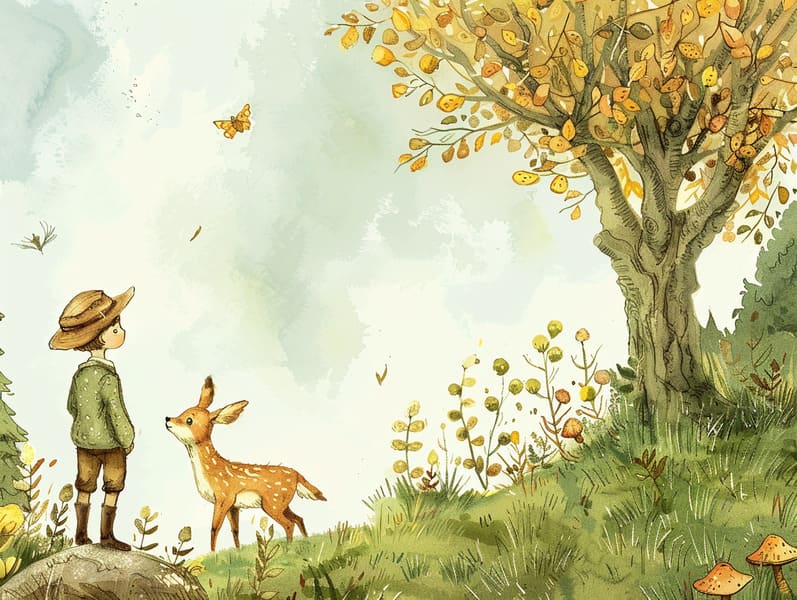
Bedtime is a cherished time for adults and their kids. It’s a occasion to relax, hug close, and experience the wonder of sleepy-time tales.
For centuries, evening stories for little ones have been a esteemed practice, offering more than just a way to slumber. They provide an chance for connection, learning, and encouraging fantasy.
How Bedtime Stories Help
Children's bedtime stories are more than just a way to end the day. They play a vital role in a child’s evolution and in fortifying the parent-child bond. Here’s why they matter:
1. Together Time: Bedtime reading builds a special moment of connection between caregivers and children. It’s a moment of togetherness that helps children feel secure and comforted.
2. Speech and Language Skills: Enjoying narratives helps children develop their verbal abilities. They grasp new expressions, understand sentence structures, and sharpen their comprehension and grasping abilities.
3. Fantasy and Imagination: Nightly stories usher them to enchanted worlds, promoting vision. They visualize characters, settings, and adventures, which stimulates their inventiveness.
4. Emotional Growth: Bedtime narratives often involve characters facing problems and moods. These scripts help kids recognize and deal with their own feelings, enhancing emotional growth.
5. Intellectual Growth: Following a story helps children develop mindfulness, remembrance, and reasoning skills. They acquire to follow stories, remember details, and anticipate results.
Making Bedtime Stories a Nightly Habit
Developing a night-time practice that incorporates storytelling is doable and beneficial. Here’s how to develop a important part of your end-of-day routine:
1. Pick a Cozy Area: Identify a relaxing place where you and your child can snuggle up without noise. A peaceful bed or a comfortable reading nook works beautifully.
2. Choose a Specific Time: Establish a regular time each night for storytime. Predictability helps children know what to expect and makes the tradition more sustainable.
3. Pick Stories for Their Age: Identify tales that are tailored to your child’s cognitive level. Young kids might appreciate simple books with straightforward tales, while older kids may appreciate longer stories with more complex plots.
4. Engage with the Story: Turn the tale be captivating by doing different accents and voices, adding effect sounds, and motivating your child to be active. Ask points about the story to hold their attention.
5. Create a Calm Atmosphere: Softly light the lights, use calm voices, and create a peaceful environment to help your child settle down.
Discovering Great Bedtime Stories
There are numerous places to look where you can find perfect bedtime stories for children. Here are some options to think about:
1. Children’s Books: Check out your community library or bookstore to find a varied selection of bedtime stories for kids. Going through the choices together can be a great activity that also permits children to decide on stories that they are drawn to.
2. Internet Sources: There are many web resources that offer free bedtime stories. Sites like kids' story platforms provide a variety of short stories for kids that you can get for free. These sites are great for finding new and interesting stories without cost.
3. Story Apps and Audiobooks: For nights when you’re too fatigued to read, look into audiobooks or storytelling apps. website These can provide a quiet narration to read your child a story, ensuring they still get their bedtime story fix. Apps often offer fun elements that can hold their focus further.
4. Personal Stories: Make your own stories reflecting your child’s passions. Personalized stories can be extremely engaging and meaningful. You can incorporate your child in the crafting process, making them a part of the adventure.
Advantages of Short Stories
Concise stories for kids are especially great for bedtime. They provide all the advantages of longer stories but are more concise, making them perfect for relaxing before sleep. Here’s why short stories are a great choice:
1. Simple to Understand: To-the-point tales are straightforward and effortless for children to follow, even after a long day. They can speedily grasp the tale and enjoy the story without losing interest.
2. Instant Engagement: Compact stories rapidly engage children, seizing their concentration and curiosity. This makes them suitable for keeping bedtime traditions smooth yet enjoyable.
3. Flexible Choices: Brief tales allow for variety in your bedtime tales. You can get a different story each night, keeping the practice interesting and exciting for your child.
4. Time Management: For busy parents, brief tales are a quick way to check children still get their nightly dose of storytelling. They fit well into a busy schedule while still offering the full plusses of a bedtime story.
The Enchantment of "Read Me a Story"
The simple phrase, "Read me a story," can bring a world of magic for children. Responding to this request not only answers a child’s wish for attention and engagement but also forms lasting experiences. Here’s why it’s special:
1. Link: Reading aloud to your child fosters a deep emotional connection. It’s a time for closeness, sharing, and bonding.
2. Legacy: Forming a bedtime story custom creates a treasured tradition that children expect every night. It’s a ritual that can be given through generations.
3. Mutual Learning: As you read, you’ll experience your child’s development and progress. Their queries, reactions, and understanding of the stories progress, offering insights into their developing minds.
4. Comfort Zone: Bedtime stories provide a safe space for children to navigate emotions, face fears, and find comfort in the familiar presence of a parent.
In Summary
Kids’ bedtime stories are a valuable tool for supporting a child’s advancement and establishing unforgettable times of closeness.